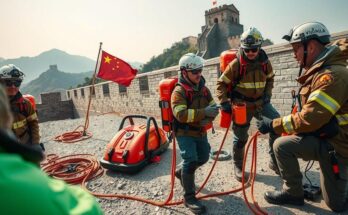Ecuador’s President Daniel Noboa faces criticisms of authoritarianism as he seeks re-election amid serious human rights violations, highlighted by the case of Carlos Javier Vega, who was shot by military personnel. Noboa’s harsh security policies have sparked public concern and debate heading into the elections, as citizens grapple with rising violence and state-sanctioned abuses.
Ecuador is facing increasing authoritarianism under President Daniel Noboa, particularly as he seeks re-election amid a backdrop of significant human rights violations. A recent case that highlights this issue is the tragic death of Carlos Javier Vega, a young man shot by military personnel who were enforcing Noboa’s harsh security measures against organized crime. Despite the government labeling him a terrorist, the prosecutor’s office cleared him, further emphasizing the lack of accountability and an apology from the government.
Vega’s family, devastated by their loss, seeks justice amid a broader context of state violence, especially towards marginalized communities such as Black youth. Noboa’s “mano dura” policy has escalated human rights violations since its inception a year ago. At present, around 13 million Ecuadorians will cast their votes in a critical presidential election that will test the support for Noboa’s iron-fisted approach.
Noboa, who inherited a wealth from his family’s banana business, became Ecuador’s youngest president in 2023 following a controversial snap election. His leadership has coincided with rising concerns over human rights, as noted by journalist Karol Noroña, who has researched military inconsistencies surrounding Vega’s case. Although issues like a severe energy crisis could influence the election outcome, Noboa appears to maintain some favor, at least in the polls.
Experts have voiced concerns over Noboa’s governing style, which reflects serious authoritarian tendencies marked by disregard for constitutional norms. Significant incidents, such as police and military forces storming the Mexican embassy to arrest former Vice-President Jorge Glas, raise alarming questions about due process and civil rights in the country. Noboa has frequently resorted to emergency measures that have curtailed civil liberties and intensified military actions against gangs and crime.
Despite his claims of improving security through a war on drugs, Ecuador has seen a resurgence in violence, stemming from its role as a cocaine trafficking hub. Although there was a temporary reduction in homicide rates, these have surged again, with other crimes, such as kidnapping and extortion, becoming more frequent. Citizens in impoverished neighborhoods are reportedly coerced into paying extortion fees to gangs, further illustrating the grim realities faced daily.
While some European authorities praise Noboa’s efforts against drug trafficking, criticisms remain regarding his government’s accountability. There are growing frustrations among citizens, who feel besieged not only by criminal groups but also by the military’s abuses of power. In an ongoing case against the military personnel involved in Vega’s death, the legal proceedings have been plagued by delays and a lack of accountability.
The family of Carlos Javier Vega reflects the emotional toll of this violence, with his mother expressing anguish over her son’s loss. They seek acknowledgment of the state’s role in his death and the broader implications of Noboa’s policies, reaffirming the belief that victims of state violence deserve justice and healing.
Since taking office, President Daniel Noboa has implemented his ‘mano dura’ policy to address increasing violent crime, particularly connected to organized crime and drug trafficking. His administration has been marked by serious human rights violations, including the unlawful use of force by military personnel against civilians. The political climate in Ecuador has grown contentious, with the upcoming elections putting public support for Noboa’s harsh measures to the test.
The situation in Ecuador under President Noboa is characterized by significant human rights concerns and authoritarian tendencies, as illustrated by the case of Carlos Javier Vega. The upcoming elections are critical in determining whether the electorate continues to support an administration that has faced widespread allegations of state violence and disrespect for constitutional rights. Continued public pressure may be necessary to hold the government accountable and seek justice for victims.
Original Source: www.theguardian.com




